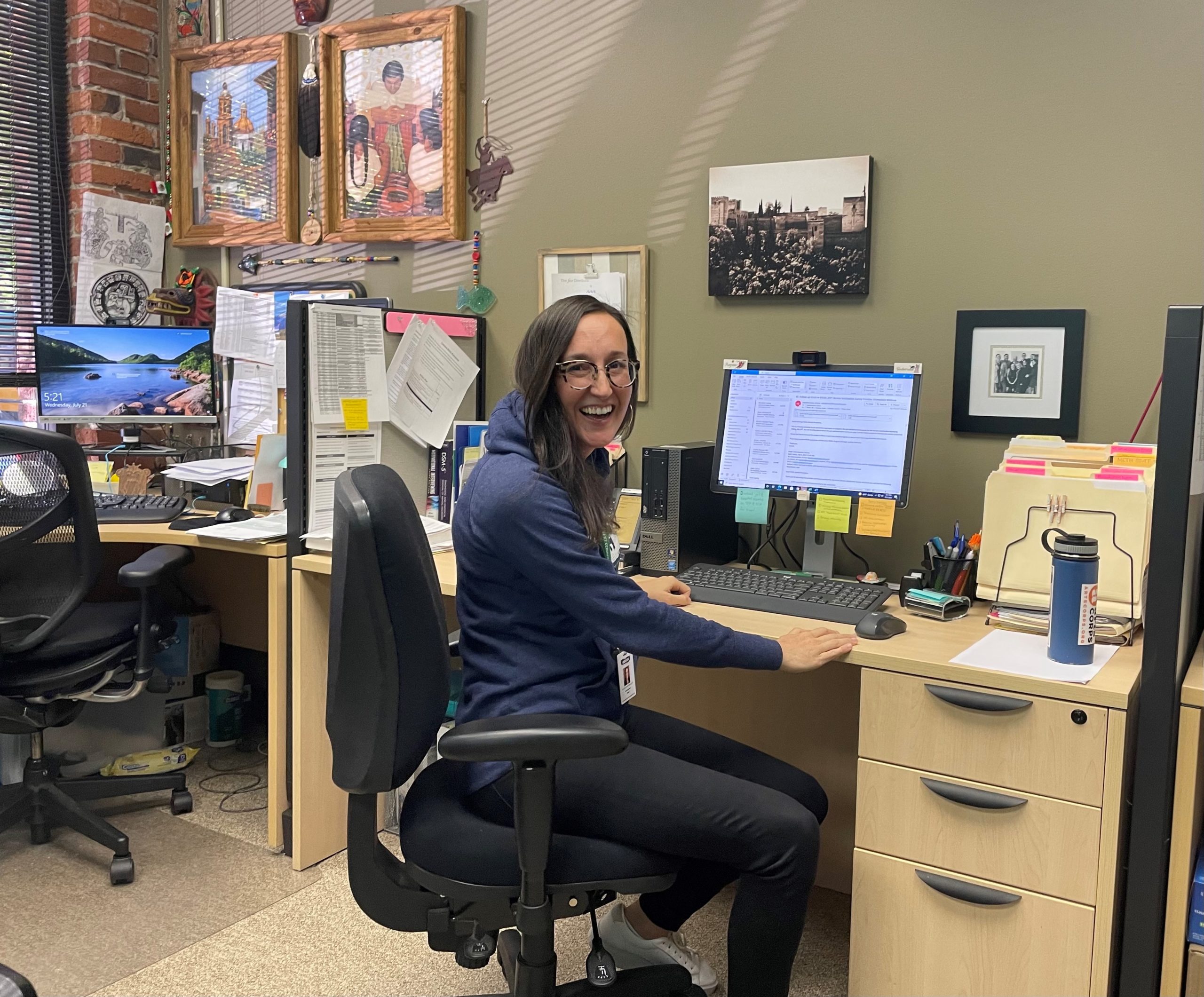
This month is the 25th anniversary of REACH. Throughout the month we will interview our four new REACH directors to highlight each of our mission areas.
Michelle Conley is the new director of integrated care, but she’s not new to REACH. She has served as Vital program manager since that program launched in 2016. Read below to learn more about her new role and her vision for integrated care.
What is integrated care at REACH, and what will your new role as director entail?
As director of integrated care, I’ll oversee a number of our longer-term case management programs. Most people are familiar with REACH’s outreach workers – they’re often in the media and out interacting with the community. You can think of those incredible folks as the ones doing the immediate “triage” work. They get to know people who live outside, build relationships, and connect them with appropriate services. In outreach, these team members could work with people for a few days or months or maybe even a year or two, depending on the situation.
Integrated care work is different in that it is more focused on the folks who need long term, intensive case management. In the last few years, we’ve focused these efforts more explicitly on communities that are most impacted by the traumas of incarceration, homelessness, and intergenerational poverty – which disproportionately affect Black, Indigenous, and communities of color. Those who are on the margins in other ways, like people who identify as LGBTQ+ and those who have survived on the streets by engaging in sex work or other means of survival often face criminal legal system involvement as well.
The focus of our work is ever shifting; the more we learn, the more we understand what gaps exist in services and adjust to meet that need.
Do you have a personal connection to REACH’s mission?
I believe that every human being has a connection to REACH’s mission. This work is about our shared humanity and our collective liberation. I believe that people do not want to see homelessness or be around someone in crisis because we can identify with that crisis in some deep, real way that none of us are immune to.
The possibility of behavioral health crisis is there for all of us. Maybe some of us got a mix from the gene pool that means we won’t have mental illness, but that doesn’t mean we won’t experience incredible stressors in our lives that could lead us to feel uncertain and unstable. Deep down, we fear that maybe we—or those we love—will struggle and experience crises. It’s a very real human fear.
I am the youngest of seven children. My oldest brother, John, started to show signs of addiction and mental illness at a pretty young age. I come from a well-connected and advantaged White family, and it was still an incredible struggle for more than 15 years. Were it not for the resources that we had, I do not believe that my brother would be where he is today: a father of three, grounded in recovery and the owner of a successful business.
So yes, I have a deep personal connection, but also a deep human connection to this mission. I’ve taken breaks where I wasn’t in social work, but they were very short breaks. I quickly found out that I can’t do anything else. This works pulls at my soul if I’m not connected to it.
Who has inspired your career?
I am most profoundly moved by the people that I supervise. The people who do this work—and see the world the way you have to see it in order to stick with it—really inspire me. They can face people, many on their worst days, and continue to love them and see them as the full person that they are. This gives me hope every day.
In terms of clients, I think there’s one particular client that comes to mind that has fueled my understanding of how deeply our systems fail people who have experienced immense trauma. We can call him Peter. He has been part of the Vital program for four years. Peter is a native man whose family was stripped of their culture and forced into residential schools. Peter and his family are so much more than their trauma, and yet amid each small piece of his story is a trauma that we could unpack for days.
His brother ended up in the system and ultimately died in a youth jail. Peter has been arrested multiple times, diagnosed with schizoaffective disorder, and is a smaller guy. He has had to learn to protect himself in jail many times. At best, our court system oversimplifies the barriers that our clients face. At worst, it completely ignores them. The system has incredible expectations for people like Peter to make dramatic changes in their lives in a matter of minutes.
In the Vital program, he is doing really well. We were able to help him get housed, but he lives with constant paranoia. He’s in a treatment court now, and yet even within that court he faces challenges with the strict compliance requirements and constant threat of jail which fuels a sense of hopelessness. We can’t do anything right until we change how people who use substances are viewed in these systems.
Peter has had no new criminal law violations over the last two years, which is very significant for the population that we serve. However, because he failed a few drug tests, even though he hasn’t violated any laws and his substance use hasn’t negatively affected anyone around him, they are considering putting him back in jail. This gives zero recognition of how far he has come, and he has said that he feels like there’s no point in even continuing to try.
In Vital, we have about 65 folks in situations like this. Each demonstrates some serious complexity that is completely ignored by the systems that continue to demand so much from them while leveling the threat of jail. We need to lean into the belief that we have what we need to heal ourselves in our communities, not in cages. We can create systems that are uplifting and healing.
What is your vision as director of integrated care?
REACH has chosen to situate itself closer to these systems of compliance and incarceration because our folks are caught up in them. We also recognize that the people who participate in these systems are part of our community. They have power, and they also have hearts and minds that can be invited into conversation about different ways of thinking that counter the status quo. We need them and want to offer them something that actually brings about the outcomes that we all want to see.
My vision for this position is that we continue to center those most severely impacted by the interlocking crises of homelessness, incarceration, and substance use by uplifting them with our innovative, street-based care while breaking down the silos and systemic barriers that hinder healing along the way. As we continue to foster our existing and invaluable relationships with external housing and healthcare providers, like Plymouth and Neighborcare, I am also eager to invite the unlikely partner—like prosecutors—into conversation, so as to shift the hearts and minds of those who have power over our clients in ways that help our clients’ stories and histories to be more thoroughly understood. Ultimately, I look forward to building community that returns power and healing to our clients, further proving systems of compliance and control obsolete.
We are coming up on the 25th anniversary of REACH and the organization has grown a lot. Looking forward another 25 years, where do you hope REACH will be?
I don’t want us to be this monolith that continues to fill a growing divide between those who have what they need and those who live in desperation. I want to implement services that stop the growth of that divide. I hope we can get to a place where we see, as a community, that we are all better off when we all have what we need to take care of ourselves and those we love.
REACH has known for a long time—25 years—what is needed to help those living outside and experiencing addiction feel connected, safe, and find healing. But, because of how our society is structured and our nonprofit status, we haven’t been supported to scale what works. I am eager to partner with our community, whether with elected officials or others to build out an infrastructure and a system that is healing-centered and supports people who are on the brink of crisis.
I’ll be honest in that I don’t see a lot in this direction, but I hope that shifts. We can develop solutions that honor human dignity and fund these approaches to resolve the deep, systemic issues we face. REACH will be a participant in that work, but we’re not going to be able to do it all. It’s going to take all of us.
Want to learn more from REACH directors? Check out our interview with Director of Outreach Karen Salinas and stay tuned for interviews with our directors of housing and community justice.




